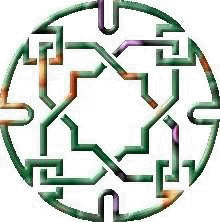

|
|

Allal al-Fassi

Muhammad Allal al-Fassi (1910 –1974), one of the leaders of modern Islamic thought, a Moroccan politician, writer, poet and Islamic scholar.
His Life
Allal al-Fassi was born in Fes, Morocco, from a well known family dwelled from 'Al-Andalus' to flee with its religion from Inquisitions imposed by the new Spanish conquerors to Muslim inhabitants. The family settled at the city of Fes and brought eminent judges, 'Ulamaa' (Islamic knowledgrables) and writers. In his youth he preserved Al-Qur'an and studied Arabic language and principles of the Islamic religion in the city of Fes. Afterwards he studied at the mosque of Quarawyeen from which he got the certificate of 'Al-Alamya', and he taught different Islamic sciences at the mosque for some time.
His Political Thought
Allal al-Fassi founded the nationalist Istiqlal party which was a driving force in the Moroccan struggle for independence from French colonial rule. He broke with the party in the mid-1950s, siding with armed revolutionaries and urban guerrillas who waged a violent campaign against French rule, whereas most the nationalist mainstream preferred a diplomatic solution. In 1956, as Morocco gained independence, he reentered the party, and famously presented his case for reclaiming territories that have once been Moroccan in the newspaper al-Alam. In 1959, after the left-wing UNFP split off from Istiqlal, he became head of the party. He advocated the Arabisation of Berbers and Islamisation of the school system through madrasahs.
In 1962, he briefly served as Morocco's Minister of Islamic Affairs. He was elected to the Parliament of Morocco in 1963, and served there as an Istiqlal deputy. He then went on to become a main leader within the " opposition" during the 1960s and the start of the 1970s. He died in 1974, on a visit to Romania where he was scheduled to meet with Nicolae Ceauşescu.
His works
Allal Al-Fassi has left many articles, poems as well as books in diverse fields, among his important books:
· The Independence Movements in Arab North Africa (1954).
· Protection in Morocco from both the historical and legal sides.
· Barbers' politics in Morocco.
· Self critic.
· Morocco from the first European world war till today.
· The talk of Morocco in the east.
· A believe and Jihad
· The method of autonomy
· The intentions of the Islamic law (Al-Shary'a) and its goodness.
· A defense of Al-Shary'a.
· The battle of today and tomorrow.
· In order not to forget.
· Two lectures about Muslim scientists.
· The high example in truthfulness and steadfast
· The efforts of Al-Emam Malek and his followers
· The present state of the Islamic world.
· The Moroccan Humans.
· The stolen desert of Morocco.
· In defense about authenticity.
· On economic creeds.
· A collection of research works in literature and sociology.
· Does human needs philosophy.
· The history of Islamic legislation.
· A detailed research on different philosophical theories in comparison with freedom in Islam.
· Documents on the history of Moroccan resistance.